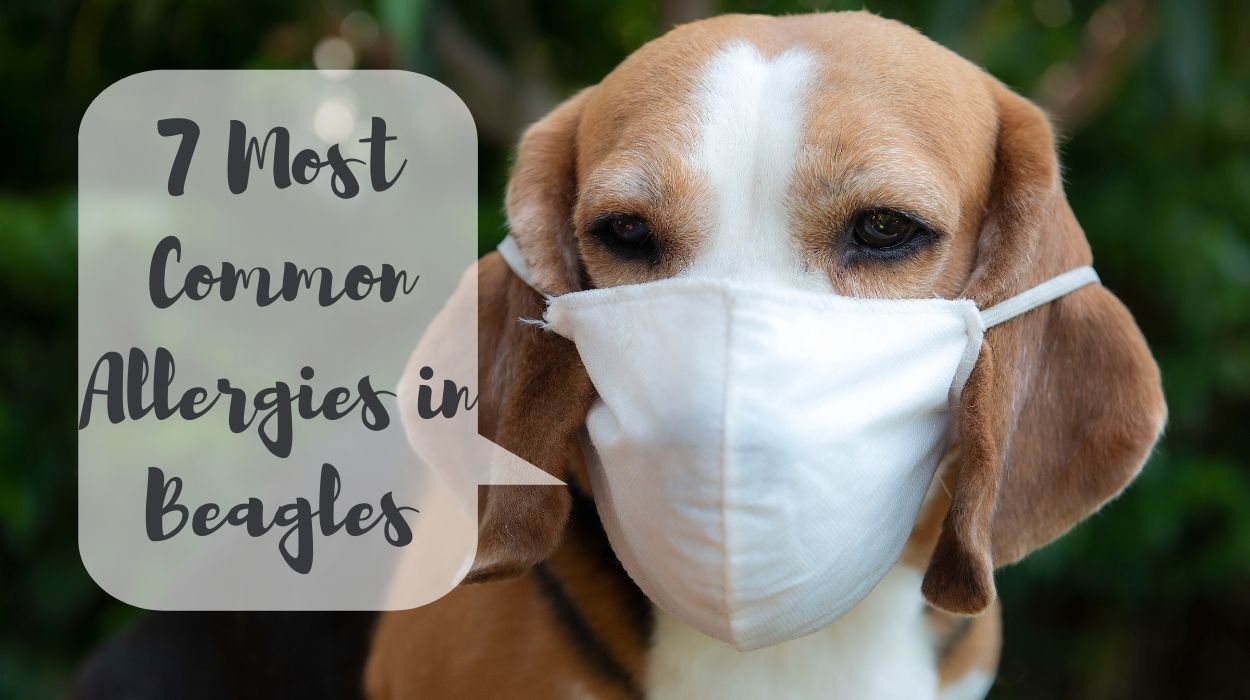Did you know that 10% to 20% of pets in the world are likely to catch allergies?
With so many allergies out there, it’s no surprise that your pet could become a victim of one at some point. But now you don’t have to feel helpless or concerned because I’ve summarised every answer on Beagle allergies, how to identify them, and how to treat them in this article.
On your way out, please take a good look at the allergy location on their skin as it can help you a lot in identifying your Beagle’s allergy.
Why Are Beagles Prone to Allergies?

Because Beagles are so similar to humans, they are more prone to allergies than any other dog breed. Despite many types of research, the reason why this happens to a Beagle is still unknown; it could be seasonal, nutrition, or environmental. Another theory is that Beagles have a genetic predisposition to allergies and other skin problems.
Dachshunds, Cocker Spaniels, German Shepherds, Basset Hounds, Labrador Retrievers, and Terriers are among the other dog breeds in this group.
7 Common Allergies In Beagles With Treatments & Precautions
Various factors can cause a Beagle’s allergy; here is a list of the most common Beagle allergies, along with their causes, symptoms, and treatment options.
1. Food Allergy

The first allergy that we will discuss today is a food allergy. This allergy is quite hard to diagnose because your dog’s dietary item may not cause any gastrointestinal symptoms at all, making it challenging to identify. Your dog can develop this allergy when its immune system reacts badly to a specific ingredient.
This allergy can occur due to one of the substances present in your dog’s food. But, that doesn’t mean that your whole dog food is of low quality or marked as “poor-branded,” because even the most luxurious brand of dog food can cause allergies at times to your pup.
Causes of Food Allergies:
The following are the most common causes of food allergies in dogs:
- Beef
- Eggs
- Chicken
- Dairy
- Soy
- Corn
- Lamb
- Wheat
Food Allergy Symptoms:
The following are some of the most common food allergy symptoms:
- Skin Rash
- Diarrhea
- Biting paws
- Ear Inflammation
- Itching
- Fur loss
- Vomiting
How to Treat:
To treat food allergies, take the following steps.
- Make an appointment with a veterinarian.
- To find the origins of a food allergy, try a variety of foods one at a time.
- Read the list of ingredients in the dog food you give to your dog to avoid any allergic reactions.
2. Flea Allergy
There are many studies and evidence that flea allergy is one of the leading causes of allergy in dogs. Flea allergies can develop in your dog at any age as they come in contact with flea now and then. It makes your Beagle itchy and irritated, particularly at the base of their tails.
Flea allergy arises in dogs when a flea bites your pooch. For reproduction, fleas must bite a dog and obtain a blood meal. During their meal, these fleas inject a small amount of saliva into the dog’s body, inducing an allergy in your sensitive Beagle’s body. The duration of this allergy can last up to two weeks in your dog’s body, making them feel unhappy and annoyed.
Causes of Flea Allergies:
The only cause of flea allergy is the saliva present in the flea’s body.
Flea Allergy Symptoms:
The symptoms of flea allergy are listed below.
- Skin rash
- Too much itching and biting
- Red bumps
- Fur loss
How to Treat:
Follow the given tips to treat Flea allergy.
- Call your Vet
- Follow the recommended dog allergy treatment for your pooch
- Try monthly topical and oral flea preventives
- Enforce strict flea control
3. Environmental Allergy
As the name suggests, environmental allergies arise due to environmental factors. As you know, Beagles are a high-energy breed that enjoys being outside. So they are often prone to these allergies.
Beagles can get environmental allergies by inhaling the allergens present in the surroundings. Luckily, this type is frequently seasonal, referring to particular plants that grow at different times of the year. But, sometimes, they can occur at any time of the year due to dust, mildew, mold, or pollens.
Causes of Environmental Allergies:
The causes of environmental allergies are as follows.
- Trees
- Grasses
- Pollen
- Ragweed
- Dust
Environmental Allergy Symptoms:
The following are the signs and symptoms of an allergy to the environment:
- Itching
- Biting
How to Treat:
You can treat your dog from environmental allergy in the following ways:
- Take your dog to the vet and have any allergic reactions treated.
- Follow your veterinarian’s advice to figure out what’s causing the allergy.
- Give allergy shots to boost your immune system’s resistance to allergens.
4. Human-Product Allergy
There are certain human products that your dog can’t withstand. Your dog may develop allergies to the fragrances or ingredients in these human products. In such a case, you should avoid using those products if you wish to be a responsible pet parent.
Your dog doesn’t need to be allergic to all kinds of human products; they can be allergic to just a few products only, and that too because of the ingredients present in them. Continue reading to learn more about this allergy.
Causes of Human-Product Allergies:
- Cigarette smoking
- Cleaning products
- Deodrants or perfumes
- Plastic materials
- Rubber
Human-Product Allergy Symptoms:
The following are the symptoms of human-product allergy.
- Vomiting
- Swelling
- Itching
- Sneezing
How to Treat:
Follow the given tips to treat human-product allergies in dogs.
- Regular vacuuming and cleaning can help reduce allergic reactions.
- Avoid using the items mentioned above in front of your Beagle if your vet has diagnosed an allergy.
- Don’t use any potentially toxic cleaning products around your Beagle.
- Contact your veterinarian, who will perform a physical examination and review the pet’s medical history.
5. Shampoo Allergy
Before jumping to any conclusions, please keep in mind that dogs are not allergic to shampoo but its ingredients. These components could be preservatives, foam boosters, or emulsifiers such as Isopropanolamine, Cocamide MEA, and Glyceryl stearate. Because Beagles are sensitive breed dogs, shampoo allergy is another type of allergy that your Beagle may develop.
Shampoo allergies occur by an overactive immune system cell’s reaction to a protein in the shampoo that the canine body perceives as an intrusion. Allergies mainly originate from medicated dog shampoos and sometimes perfume shampoos.
Causes of Shampoo Allergies:
Following are the causes of shampoo allergies.
- Preservatives
- Emulsifier
- Conditioner ingredient
- Foam booster and stabilizer
Shampoo Allergy Symptoms:
If your dog exhibits any of the following symptoms, he may have a shampoo allergy.
- Chronic ear infections
- Chronically swollen feet
- Rubbing face
- Itching or discomfort
- Bald spots
- Head trembling
- Hives
- Swelling, especially around the face
- Skin ulcerations
- Lesions that resemble blisters
- Paw biting, Obsessive licking
- Infections of the skin
How to Treat:
You can treat your Beagle from shampoo allergies using the following tips:
- Never use human shampoo on a dog’s coat because it can harm it.
- Consult a veterinarian about your dog’s condition.
- Use high-quality dog shampoo to avoid allergies.
- To minimize exposure, any skin that comes into contact with the shampoo should be thoroughly rinsed in cool water as soon as possible.
6. Medication Allergy
There are times when you bring the medicines for the well-being of your dog cause harm by any allergic reaction. A dog’s allergic reaction to one of the drugs prescribed by the veterinarian is possible in some cases. An adverse reaction to medication is one of the most common causes of death in dogs.
It can occur due to administering human medications, such as antihistamines or antibiotics for an illness or injury, or it can occur due to helping an animal medication, such as flea treatment. So whether dogs or humans, one should exercise caution when administering medication.
Causes of Medication Allergies:
An adverse reaction to medication can occur for a variety of reasons, including:
- Incompatible drug combinations
- Double-dosing
- Allergy
- Incorrect dosage
Medication Allergy Symptoms:
The symptoms of medication allergy can vary from regular to severe. It depends on the type and concentration of specific components in the medication you gave your pup.
- Red Rashes
- Excessive scratching.
- Weak pulse
- Hives
- Diarrhea
- Anaphylactic shock
- Sneezing
- Watery eyes
How to Treat:
Medication allergy can have severe consequences for your dog; hence, the only advice we would like to give you is that take your Beagle to the vet as soon as you notice something is wrong with him.
For more medication information, allergies click here.
7. Seasonal Allergy

The last type of allergy we are going to discuss is Seasonal Allergy. Your sensitive puppy is just like you; hence they can catch season allergies just like you. The leading cause of this allergy is seasonal or components present in your surroundings.
Whenever your dog comes in contact or inhales a substance to which they are allergic, their immune system starts to react negatively, causing the seasonal allergy. Though these allergies only trigger your Beagle’s body by seasonal variables like fresh grass, pollen from trees and flowers, dust and molds during spring, summer, and winter.
Causes of Seasonal Allergies:
Seasonal allergies mainly occur by seasonal elements such as:
- Fresh grass
- Tree and grass pollen
- Molds
- Dust mites
Seasonal Allergy Symptoms:
Given below are the symptoms of seasonal allergies:
- Ear Infections
- Sneezing Fits
- Swollen or red eyes
- Itchy skin
- Runny nose
How to Treat:
You can treat seasonal allergies in the following ways:
- Take advice from your vet and use the allergy serum provided by him to resist allergies.
- When you come back from a stroll with your dog, use wet wipes to clean them.
- Bathing your dog weekly using oatmeal shampoo can also be very helpful.
Skin Allergy Locations On Beagles
Now that you know about Beagles and various allergies that they are prone to, we will fill you in with multiple locations on which your Beagle can have effects of skin allergy. In Beagles, the allergy symptoms start showing up between one and three.
So if your Beagle has a skin allergy, it may develop skin irritations on any of the following body parts:
- Patchy, thinning fur or hair loss with itching can occur anywhere on the Beagle’s body to indicate skin allergy.
- When a Beagle has a severe allergy, he may eat the fur off his legs to relieve the itching. Sometimes they even bit and itch excessively, particularly the leg area.
- Dry, flaky skin is typical in the abdominal area, and it’s often the skin beneath the coat that’s reacting to allergens.
- Another allergy-prone area is the ears. There can be frequent inflammation and infections in this area.
- Allergies can also affect the eyes in Beagles, causing excessive discharge from eyes or seeming inflamed and bloody.
Conclusion
I know you adore your furry friend and want to protect them at all costs, but sometimes things are beyond our control, and your Beagle may become ill as a result. We can try to avoid factors such as medication, shampoo, and food; nevertheless, the rest of the factors like environmental and seasonal factors are out of our hands; in such cases, even the most stringent preventative measures may appear futile.
In the end, I hope you found this post helpful and that you can now diagnose and treat your dog immediately. If you take all precautions and your dog still develops allergies, don’t worry; it’s not your fault. Beagles are a sensitive dog breed prone to infections, allergies, and diseases. However, your Beagle does not have to suffer from these allergies indefinitely; you can avoid them by identifying the symptoms and following the tips provided.

Dr. Aram Baker has been with Santa Clarita Animal Hospital since 1995 and his special interests include behaviour medicine and dermatology. He graduated from the Cleveland Humanities Magnet Program in Reseda, CA and attended California State University at Northridge where he received a Bachelor’s degree in biology. He went on to pursue his Doctorate in Veterinary Medicine at the University of California at Davis. He also spent time in the zoological medicine department at U.C. Davis during his Junior and Senior years. He is dedicated to caring for all pets big or small, young or old with compassion, patience, kindness, and love.
